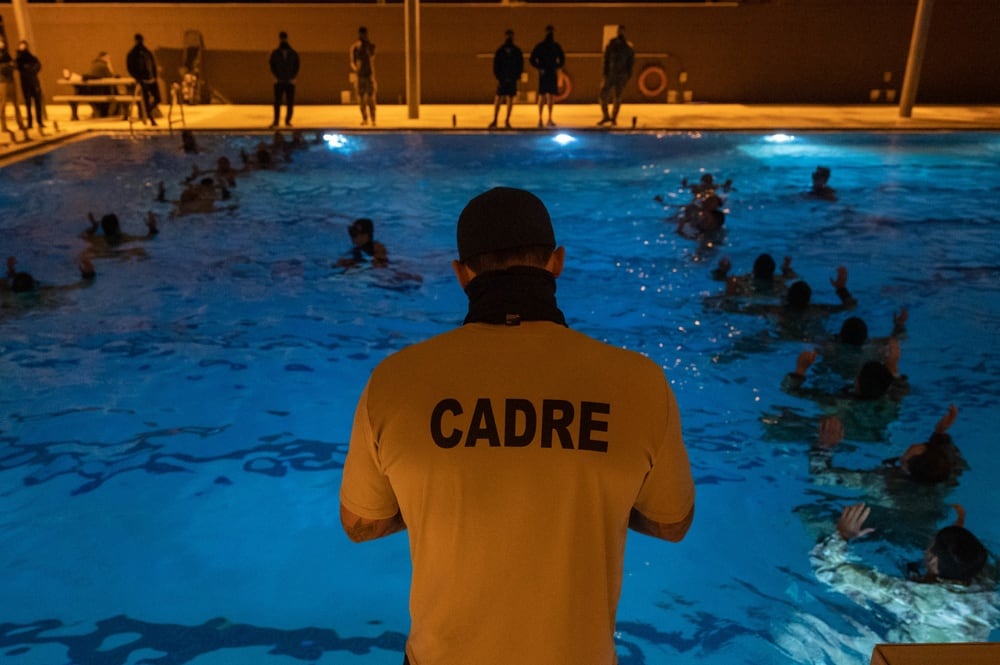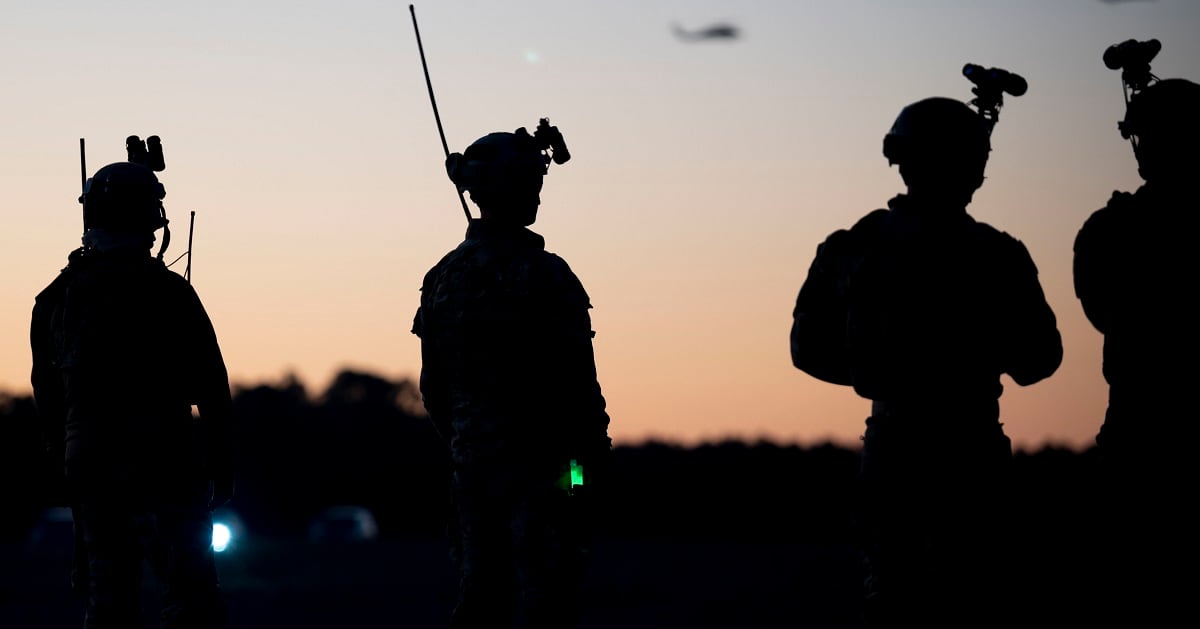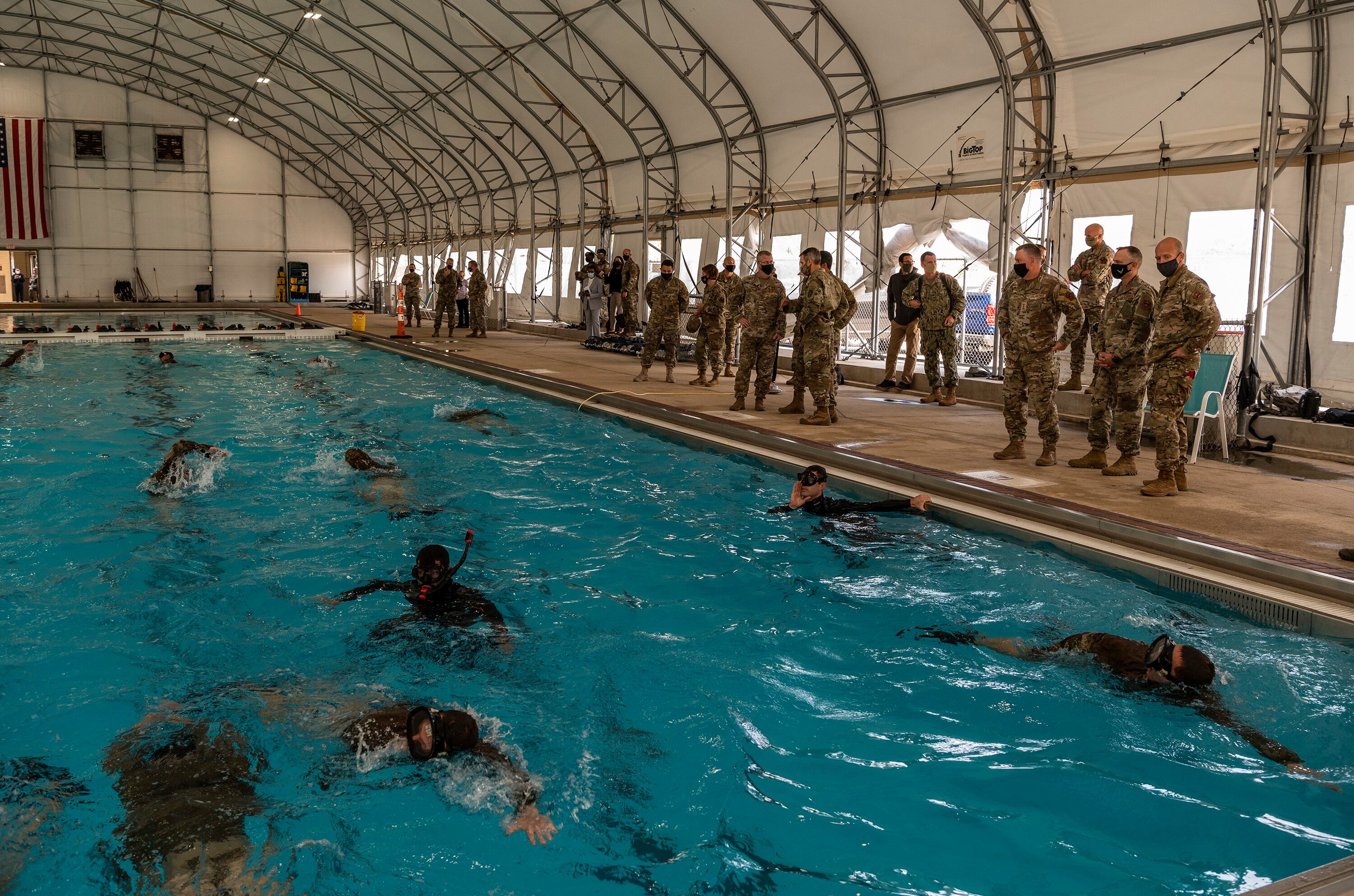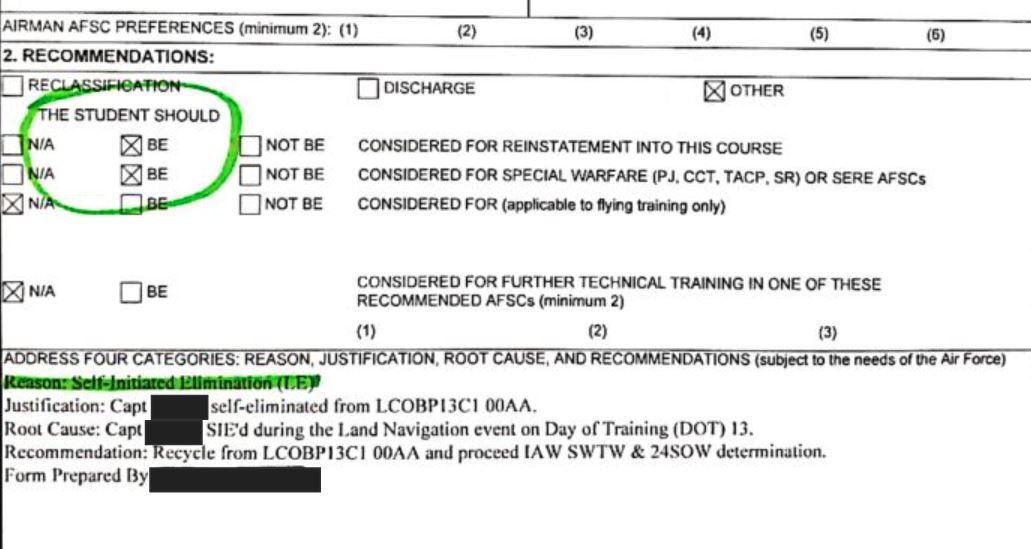A female captain who may become the Air Force’s first woman to complete its elite special tactics training raised concerns about the program’s shifting standards as early as April 2021, Air Force Times has learned.
Multiple documents obtained by Air Force Times — including performance forms, score charts and a report the woman authored shortly after dropping out of a land navigation event — illustrate how she was allowed to return to training after she quit, and how physical training metrics were lowered just as she arrived at a challenging schoolhouse last spring.
“I believe the change in standards invalidated me with a majority of my team,” she wrote in an April 2021 memo to an unnamed master sergeant about her experience at the school. “One [instructor] cadre member had a conversation with a student and said that the cadre ‘rioted’ when they found out the PT test was changing back to lesser standards.
“Perhaps all of this timing was coincidental, but looks highly suspicious with my arrival on campus,” she added. Air Force Times is withholding her name for privacy reasons.
RELATED

The airman’s account and other paperwork contradict public statements that Lt. Gen. Jim Slife, the head of Air Force Special Operations Command, issued during the first week of January to refute claims that his organization is unfairly pushing an unqualified female airman through special tactics training.
An anonymous letter circulated online alleged that AFSOC tweaked the training benchmarks to her benefit and allowed the woman to return after she tried to quit the program three times.
In statements to the press and a Jan. 7 letter to airmen, Slife said the anonymous letter was inaccurate and took the situation out of context.
“We do make changes in how we train airmen in order to improve the effectiveness of our training, but we do not lower our standards. … Period,” he wrote.
Air Force Times on Monday asked AFSOC to comment on the new information. The command referred a list of detailed questions and screenshots of documents to Air Education and Training Command, which manages the special warfare pipeline.
AETC spokeswoman Marilyn Holliday said Wednesday the service would not answer the query.

‘They believed the standards had been bent’
Special tactics is the Air Force’s name for a collection of commando jobs, including combat controllers, pararescue and special reconnaissance airmen, who are all led by special tactics officers. It’s a small cohort within the far larger AFSOC world, comprising roughly 1,000 operators, and it is the Air Force’s most decorated community since the Vietnam War.
The female captain is one of only a few women who have attempted to earn a commando’s beret since the Air Force opened the prestigious career fields to female airmen in 2016. None have succeeded.
In January 2020, the female captain passed the physical fitness test needed to graduate from the special warfare assessment and selection course, according to a score sheet obtained by Air Force Times. But when she left for Combat Control School in North Carolina — the most challenging part of a yearslong program that entails air traffic control, parachute and dive training — she learned the physical standards had been lowered.
Had she been held to the previous criteria, she would have failed, according to her score sheet and memo. The change was so recent that her scores were still marked as a failure on electronic records when she took the test in late March 2021, since the grading database wasn’t updated with the new rubric, according to the paperwork and a source familiar with it.
“[Teammates] knew the [standard] was at one point 300 pounds for the deadlift. During the test, we were not told any standards, and I lifted 250 pounds,” the woman wrote in April. “Since I passed, they believed the standards had been bent for me.”
RELATED

The woman chalked it up to poor communication. Any edits to PT requirements should be “widely disseminated and provided with time to train,” she wrote.
“If a person can meet the standard of a job,” she said, “they should be allowed to do the job.”
All of the woman’s face-to-face interactions with instructors and staff were professional, she also wrote. But she believes rumors spread before she arrived in North Carolina.
Multiple students told her instructors were “preparing their warships” and did not want her to graduate. One told her that a trainer openly discussed his disdain of the soon-to-arrive female candidate in front of an entire team of students.
“Had I chosen to continue, I would be responsible for leading these men,” the woman wrote. “Any bias that is created and supported by people in positions of authority (the cadre) would make it difficult for me to lead them.”
The female captain’s April memo does not mention any pressure from instructors to leave, or “self-eliminate.”
Deviating from the norm
The author of the anonymous letter said the female airman has tried to quit training three times — twice in water confidence sessions and once during land navigation. Self-elimination has long meant that an airman’s attempt to join special tactics is over, yet documents show a different standard applied to the female captain.

Four airmen who quit during Combat Control School at different points throughout 2019 were ordered to be reclassified into other jobs, according to administrative forms provided by a source to show how the situation is normally handled. Two airmen quit during rucksack-toting marches, one dropped out during psychological training to withstand stress, and another pulled out during land navigation.
None of the four were recommended for reinstatement. In contrast, the female candidate’s form recommended that she be considered to reenter the course after taking herself out of the land navigation event.
While the other airmen’s forms suggested they transfer elsewhere, citing Air Force policy, the woman’s paperwork advised supervisors to readmit her and “proceed [in accordance with Special Warfare Training Wing and 24th Special Operations Wing] determination.”
One instructor, a member of the team that was vetting students and who spoke on condition of anonymity, previously confirmed to Air Force Times that the female candidate also tried to quit in the pool during special tactics officer selection in 2018.

“When a self-elimination occurs, the student is typically returned to their previous duty assignment and either reclassified by the Air Force or given the option to separate from the military,” the anonymous letter reads. “She was presented [with] very different circumstances.”
Another chance, and an investigation
A year after leaving Combat Control School, the woman is expected to return to Fort Bragg, North Carolina, for another try in April. Senior leaders at Hurlburt Field, Florida, allegedly counseled her to stick with the program after she quit in 2021, according to the anonymous letter.
She’ll head back to Bragg in the shadow of an Air Force inspector general investigation into the allegations.
Air Force spokesperson Rose Riley confirmed Tuesday that Secretary Frank Kendall on Jan. 8 directed the service’s IG to begin the inquiry, the day after Slife issued a memo asking for that review. It’s unclear how long the probe could take.
Qualified female officers will undoubtedly join special tactics eventually, the anonymous author said, but how AFSOC has handled this case is cause for concern.
“Setting up a quitter for success, regardless of gender, sets a dangerous [precedent] for all SOF members,” they wrote. Special treatment “degrades the image of women in [special tactics], as they will be doubted by all members for years to come.”
Rachel Cohen is the editor of Air Force Times. She joined the publication as its senior reporter in March 2021. Her work has appeared in the Washington Post, the Frederick News-Post (Md.), Air and Space Forces Magazine, Inside Defense, Inside Health Policy and elsewhere.
Kyle Rempfer was an editor and reporter who has covered combat operations, criminal cases, foreign military assistance and training accidents. Before entering journalism, Kyle served in U.S. Air Force Special Tactics and deployed in 2014 to Paktika Province, Afghanistan, and Baghdad, Iraq.




